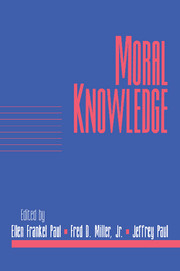Book contents
- Frontmatter
- Contents
- Introduction
- Acknowledgments
- Contributors
- Realist-Expressivism: A Neglected Option for Moral Realism
- Thinking about Cases
- But I Could Be Wrong
- Moral Facts and Best Explanations
- Two Sources of Morality
- “Because I Want It”
- Realism, Naturalism, and Moral Semantics
- Incomplete Routes to Moral Objectivity: Four Variants of Naturalism
- Explanation, Internalism, and Reasons for Action
- Moral Knowledge as Practical Knowledge
- Practical Reason and Moral Psychology in Aristotle and Kant
- Hypothetical Consent in Kantian Constructivism
- Mill's “Proof” of the Principle of Utility: A More than Half-Hearted Defense
- Index
Moral Facts and Best Explanations
Published online by Cambridge University Press: 04 August 2010
- Frontmatter
- Contents
- Introduction
- Acknowledgments
- Contributors
- Realist-Expressivism: A Neglected Option for Moral Realism
- Thinking about Cases
- But I Could Be Wrong
- Moral Facts and Best Explanations
- Two Sources of Morality
- “Because I Want It”
- Realism, Naturalism, and Moral Semantics
- Incomplete Routes to Moral Objectivity: Four Variants of Naturalism
- Explanation, Internalism, and Reasons for Action
- Moral Knowledge as Practical Knowledge
- Practical Reason and Moral Psychology in Aristotle and Kant
- Hypothetical Consent in Kantian Constructivism
- Mill's “Proof” of the Principle of Utility: A More than Half-Hearted Defense
- Index
Summary
INTRODUCTION
Do moral properties figure in the best explanatory account of the world? According to a popular realist argument, if they do, then they earn their ontological rights, for only properties that figure in the best explanation of experience are real properties. Although this realist strategy has been widely influential—not just in metaethics, but also in philosophy of mind and philosophy of science—no one has actually made the case that moral realism requires: namely, that moral facts really will figure in the best explanatory picture of the world. This issue may have been neglected in part because the influential dialectic on moral explanations between philosophers Gilbert Harman and Nicholas Sturgeon has focused debate on whether moral facts figure in relevant explanations. Yet as others have noted, explanatory relevance is irrelevant when it comes to realism: after all, according to the popular realist argument, it is inference to the best explanation of experience that is supposed to confer ontological rights. I propose to ask, then, the relevant question about moral explanations: should we think that moral properties will figure in the best explanatory account of the world?
A preliminary word about the significance of the question is in order. Many moral realists—in particular, the so-called “Cornell realists” — take explanatory potency in the above sense to be sufficient for realism. This position, however, no longer seems tenable in light of the powerful criticisms of inference to the best explanation (IBE) as a license for realism. Instead, we should construe explanatory potency only as a necessary—but not sufficient—condition for realism.
- Type
- Chapter
- Information
- Moral Knowledge , pp. 79 - 101Publisher: Cambridge University PressPrint publication year: 2001
- 1
- Cited by



